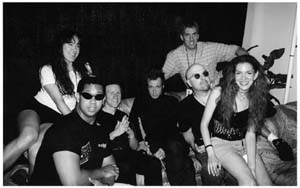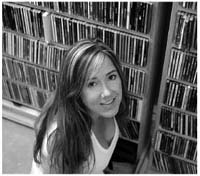Radio Free Boston (45 page)
Authors: Carter Alan


Scott Weiland at the
WBCN
River Rave, 1998, with (left to right) Juanita, Nik Carter, Oedipus, Steve Strick (top), Bradley Jay, and Melissa Teper. Courtesy of
WBCN
.
WBCN
wasn't merely a sitting duck, though; its staff learned to expect some animosity at certain harder rock shows. Mark Calandrello, known as “Cali” to his coworkers, who arrived in early 1998 and became Chachi's full-time assistant, signed on just as the Opie and Anthony assault reached its peak.
The racial remarks really kicked the rivalry into high gear. No matter what it was, if it fit the audience, we were battling with âAAF over everything! I was
on the
WBCN
“Street Team” at that point, and we brought in a bunch of college kids who weren't afraid of a fight or getting their hands dirty. We would terrorize the other stations, especially âAAF, because we were sticking up for Nik. We'd go into their backyard at the Worcester Centrum, where they'd be broadcasting from a bar next door. We'd wait outside for them to go live on the air and run inside with a megaphone, shouting “Rocko [âAAF night jock], you fat fuck! You suck!” When they would leave their van at concerts on Lansdowne Street, we would wrap them in '
BCN
roller banner and put '
BCN
stickers all over them; then we'd take pictures and put them on our website.
Despite the bad blood, though, Cali didn't believe the intense competition was necessarily a bad thing: “We had a hard-core rivalry that lasted for years; other than that Opie and Anthony racial stuff, it made for great radio.” Derek Diedricksen, known on air as “Deek,” joined the
WBCN
DJ
lineup in 2000: “We did a broadcast from a Korn show or something, and they had the radio stations, â
FNX
, âAAF, and '
BCN
, all together in this tiny room. Everyone was sitting there being awkward and stupid,
not
talking to each other, like this was some religion by which we must abide! So, I went over and said hi to Jay Ferrara, who was the âAAF guy up against me [on the air], and he was nice enough. Two days later, he was back at it, talking crap about me on the air. But, hey, it's entertainment; it's a job. I never took any of it seriously.”
In June '99 the competitive spirit between the two stations became national news when Limp Bizkit organized an unauthorized show in Boston to promote its forthcoming new album
Significant Other
. “They were the biggest band at that time; we were playing Limp Bizkit every couple hours,” Juanita recalled. But
WAAF
had been playing the metal/rap outfit since the very beginning, and the station had an entrenched relationship with the group and its record label. “I was on the air and we knew the show was probably going to be that day, but the band wasn't going to release the location except on âAAF.” Limp Bizkit's plans to do a rooftop concert, like the historic Beatles ploy in 1969, needed to be clandestine; a surprise attack might buy the group enough time to do a short set before the police moved in to shut it down. Juanita continued, “Shred just happened to be walking through the Fenway, looked up at one of the buildings, and noticed there was a band setting up on top of one. You don't see that too often! He called and told me. âOmigod!' I said. âIt's the Limp Bizkit show!'”
Juanita didn't hesitate; she shared her precious nugget on the air within moments. “I gave out the location before Limp Bizkit could call it into âAAF. As it turned out,
MTV
[News] was driving in the car with the band [filming for a documentary], listening to '
BCN
, and they heard me announce the secret location.” A video of that moment ran on
MTV
, and in it, Fred Durst (the band's lead singer) commented, “They got a war going on here,” before hustling to the garage roof right around the corner from
WBCN'S
studios at Fenway Park.
MTV
News reported, “The crowd of about 1,500 fans discovered the show's secret locale through a local radio station; so did the Boston Police, who shut down the illegal concert after a five-song, 20-minute set.” Obviously, Limp Bizkit and
WAAF
were not pleased, but over at 1265 Boylston Street, the mood was ecstatic. If
WBCN
ran itself like the military, Oedipus would have held a ceremony and pinned Silver Stars on both Juanita and Shred as members of the staff looked on respectfully, doing their best impressions of standing at attention.
WBCN'S
personality began to shift as the new-music epicenter polarized to a harder scene. Playing a wide range of alternative music in '94âeverything from the intensity of Jane's Addiction to the thoughtful musings of Tori Amosâthe overall sound of the station had changed as 1999 arrived, the focus now lingering on a fresh crop of bands playing heavier rock and rap music. To the radio industry, although
WBCN
was classified as a “modern” station and âAAF as “active rock,” the number of artists that had become common to both formats sharply increased, often making the two stations virtually indistinguishable. “When I got there,” Juanita remembered, “'
BCN
had just started playing Green Day and it was moving to a lighter alternative sound: stuff like the Verve Pipe and a lot of female artists [such as] Sneaker Pimps, Portishead . . . Oedipus's âWomen in Pain,'” she laughed. “It definitely took a late nineties left turn into that whole nu-metal, rap-rock thing.”
WBCN
chased the male eighteen to thirty-four ratings into the heavy-metal rabbit hole, and the playlist now caught up with the edgier tone already in place on the rest of the station. While Howard Stern ruled the mornings with his coarse humor and coterie of impertinent pranksters, Nik Carter held much the same sway in afternoon drive, and (stereo) grunts from the gridiron ruled
NFL
Sundays. It was abundantly clear that
WBCN'S
emphasis, in all ways, centered squarely on a battle of (and for) testosterone.

Juanita blew the whistle on the secret
WAAF
show with Limp Bizkit. Photo by Andrew King.
In 2000, the
WBCN
River Rave had swelled to colossal proportions, moving fifty thousand tickets to sell out Foxboro Stadium. The top-shelf bands
performing included Stone Temple Pilots, Filter, Cypress Hill, Powerman 5000, and local heroes Mighty Mighty Bosstones and Godsmack. The daylong festival included onstage appearances by all the '
BCN
jocks; a B stage (where Juanita's band Heidi performed, among others); a Rave tent in which pulse-pounding techno music reigned nonstop (featuring
DJ
Bradley Jay, who had returned to '
BCN
as a part-timer); an electronic gaming area; and a “cyberpit” with Internet options. “The Raves were great concerts, âChachi' Loprete observed, “a million moving parts.” The show stood as a towering triumph; five years after the first humble concert (the one actually by a river), the event had grown to fill the largest outdoor entertainment venue in New England. That achievement was overshadowed, for better or worse, by a record 126 arrests and what Dean Johnson labeled in the
Herald
as “breastapalooza.” During the show, women were encouraged to flash their assets, the images relayed and enlarged on the gigantic onstage screens for all to see. Johnson wrote, “The video expo went on for nearly the entire 12-hour concert. At one point, a âbest of' segment was shown in slow motion.” All this liberated activity raised the ire of local police and Foxboro town officials, who voiced their displeasure. Balancing their delight over the bad-boy image of the Rave with a need to assert some damage control over the official reaction,
WBCN
officials issued a rare apology, blaming the video production company for the displays. Dean Johnson smirked in print, “Considering
WBCN'S
bawdy programmingâand the fact that the
station's disc jockeys joked about it onstage and on the air, the apology is more than a little disingenuous.”
In a surprising development, considering just how much vitriol had been spilled out on the airwaves between Nik Carter and his
WAAF
tormenters just two years earlier, Opie and Anthony appeared on the massive River Rave stage, wireless microphones in hand, to motivate the
WBCN
audience. “The two weren't off the Boston airwaves for long,” the
Boston Globe
reported a month later. “The difference is that now one of Opie and Anthony's prerecorded spots invites listeners to make an obscene gesture if they see the
WAAF
van, because these days, the duo are regulars on
WBCN
, phoning in their âbits' from their New York base at
CBS
sister station
WNEW
.” The
Globe
article mentioned that the tag team also made “caustic appearances on
WBCN'S
afternoon show, as guests of the similarly puerile Carter.” To any observer, this represented a vast change of heart.
“People say, âHow could you forgive them?'” Carter reflected. “Opie and I bumped into each other in New York City and talked. Then they [both] came to Boston on a Saturday afternoon and we drank, and laughed, and fought, and yelled at each other at a bar for like five hours. They said, âWe went too far'; âthat's not who we are'; âwe were wrong.' If they were big enough to apologize, I was big enough to say, âAll right, I got ya.'” That
WBCN
had learned how to scrap it out on
WAAF'S
level was quite obvious after the 2000 River Rave. “The battle woke Oedipus up and made him competitive,” Bruce Mittman observed from across the trenches. “It also forced us to be on our game, all the time. If you don't own the streets in rock and roll, you're not a rock and roll station.” The
Boston Globe
commented, “The two stations have nearly switched places, with
WBCN
abandoning its earlier ethos to co-opt
WAAF'S
frat-boy sound and attitude.”
Across town in August 2000, Charles Laquidara ended his run at
WZLX
to move on to retirement in Hawaii. As Boston said goodbye to their legend, the distance between where his former radio home had been and where it was at the moment lay heavy in the minds of many former listeners. This was surely not your father's '
BCN
; aloha to that. Surprisingly, though it now reflected the tastes of those aggressive, disaffected, often sophomoric males it was trying to attract, '
BCN'S
grittier image still managed to generate a windfall at the bank. The
Boston Herald
peeled back the image in May 2000: “
WBCN
is a master of illusion. It pretends to be a rebellious upstart and enjoys massive street credibility. But in reality it's a slick, carefully
programmed machine that enjoys impressive ratings and sells ad rates that are the envy of corporate radio.” The article revealed that only sister station
WBZ-AM
grossed more revenue locally, with '
BCN'S
take in 1998 (the most recent numbers available at the time) at a whopping $29.2 million. “What a remarkable paradox. The station that plays cutting-edge rock with over-the-top, potty-mouthed personalities rakes in more cash than any other music signal.” This occurred despite the fact that, as the
Herald
also mentioned,
WAAF
beat
WBCN
with men eighteen to thirty-four in every day part except Howard Stern in the winter 2000 Arbitron ratings. “We kept growing the revenue, and the challenge was to continue finding ways to do that,” Tony Berardini acknowledged. The obvious dividend on '
BCN
was still Howard Stern, whose ratings were, in a word, untouchable. “At one point,” the general manager continued in amazement, “we were selling [select] spots on his show for $25,000 apiece. We were getting television rates; that was just insane.”
